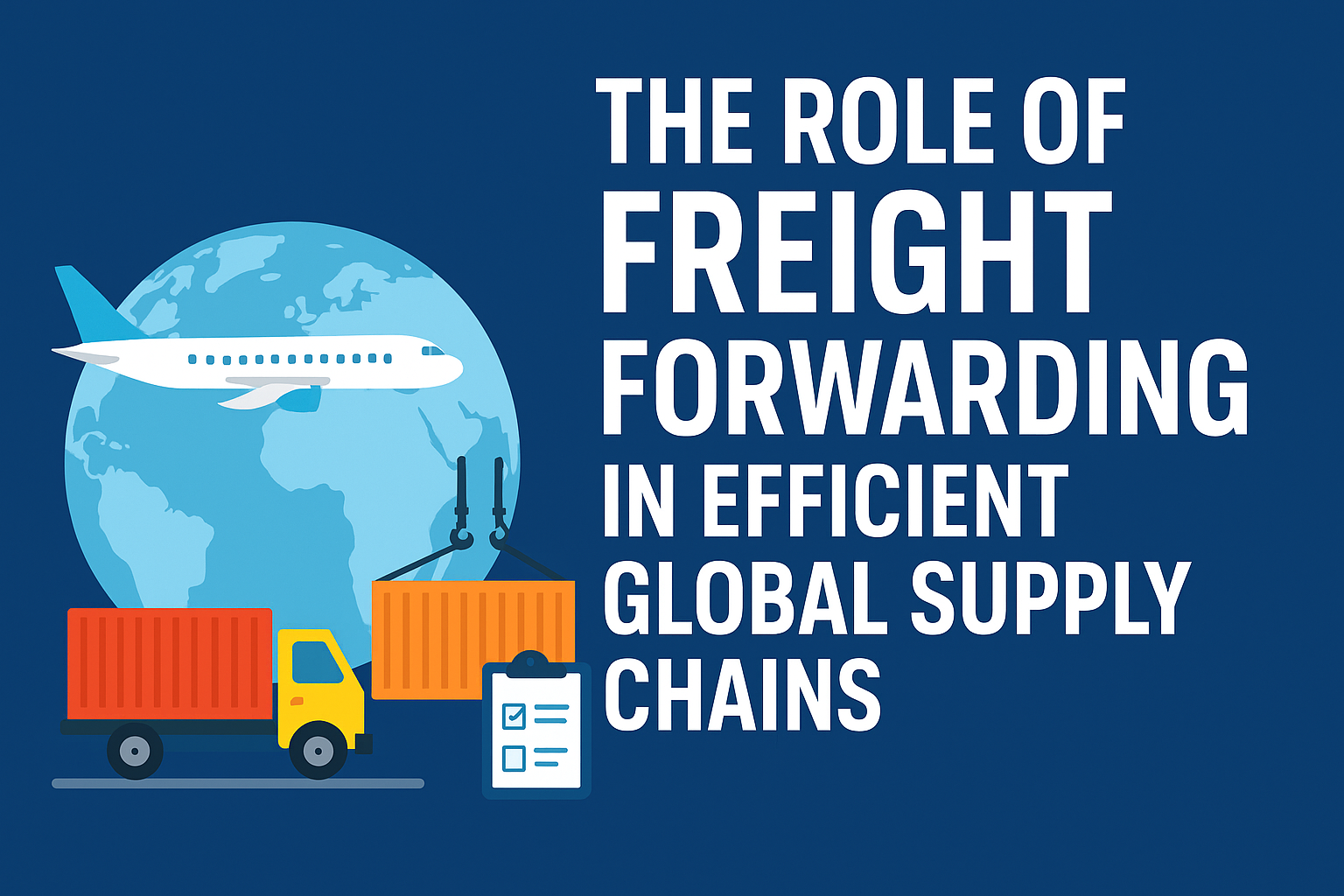In today’s interconnected world, global trade depends heavily on the smooth movement of goods across borders. Businesses of all sizes rely on efficient logistics and shipping systems to deliver their products on time and at the right cost. One critical component that ensures this efficiency is freight forwarding. Freight forwarders act as the vital link between manufacturers, carriers, and customers—making international trade faster, more reliable, and more cost-effective.
This article explores the role of freight forwarding in global supply chains, how it supports business operations, and why it remains essential in today’s dynamic global economy.
What Is Freight Forwarding?
Freight forwarding refers to the process of organizing and coordinating the shipment of goods from one location to another, often across international borders. A freight forwarder is a third-party specialist that manages all logistics on behalf of a business—handling everything from documentation and customs clearance to cargo tracking and insurance.
Rather than physically transporting goods, freight forwarders act as intermediaries between the shipper and the various transportation services (airlines, shipping lines, trucking companies, etc.). Their expertise helps businesses navigate complex logistics networks, regulatory requirements, and cost challenges that come with global trade.
Streamlining Global Trade Operations
Managing international logistics involves multiple moving parts—literally and figuratively. Freight forwarders simplify this by providing end-to-end logistics management, ensuring that goods reach their destination efficiently and safely.
Some of the key tasks they handle include:
- Booking cargo space with airlines, shipping lines, or trucking companies.
- Negotiating freight rates to achieve the most cost-effective transport solution.
- Preparing and processing documentation, including bills of lading, commercial invoices, and export declarations.
- Coordinating multiple modes of transport (sea, air, road, or rail) for intermodal shipping.
- Handling customs clearance and ensuring compliance with international trade regulations.
- Managing insurance to protect shipments against loss or damage.
By taking care of these details, freight forwarders allow businesses to focus on their core operations while ensuring goods move smoothly through the global supply chain.
Enhancing Efficiency and Cost-Effectiveness
One of the greatest advantages of using freight forwarding services is the efficiency and cost savings they bring. Because freight forwarders work with multiple carriers and shipping partners, they can leverage economies of scale to negotiate better rates and optimize transportation routes.
For example, a small business exporting products to multiple countries may not have the volume or bargaining power to secure competitive shipping rates on its own. A freight forwarder, however, consolidates shipments from various clients—reducing costs through shared container loads (LCL) or grouped air freight.
Additionally, freight forwarders use advanced logistics software and tracking tools that help streamline operations, minimize delays, and provide real-time shipment visibility. This not only cuts costs but also improves decision-making and customer satisfaction.
Ensuring Compliance with International Regulations
Global trade involves complex documentation and strict regulatory requirements. Each country has its own customs procedures, tariffs, and import/export restrictions, which can easily confuse inexperienced shippers.
Freight forwarders play a crucial role in ensuring compliance with international laws and customs regulations. They are familiar with the paperwork required for different countries, such as certificates of origin, export licenses, and packing lists. Their knowledge reduces the risk of costly mistakes, such as delays, fines, or shipment rejections.
In essence, freight forwarders act as a guide through the maze of global trade—helping businesses avoid legal issues and ensuring that shipments reach their destination without unnecessary hurdles.
Risk Management and Reliability
The movement of goods across oceans, borders, and continents always involves risk—whether from weather disruptions, port congestion, or geopolitical issues. Freight forwarders help mitigate these risks through contingency planning, insurance coverage, and proactive communication.
By partnering with experienced carriers and maintaining a global network of logistics partners, freight forwarders can quickly find alternative routes or transport modes if disruptions occur. Their ability to adapt to unforeseen challenges ensures that the supply chain remains resilient and reliable.
Moreover, many freight forwarders offer cargo insurance, protecting businesses from financial losses due to theft, damage, or delays. This layer of security adds peace of mind and strengthens trust between suppliers and customers.
Technology and the Future of Freight Forwarding
The logistics industry is undergoing rapid digital transformation, and freight forwarding is no exception. Modern freight forwarders now use digital platforms, AI-driven analytics, and real-time tracking systems to optimize efficiency and transparency.
Technologies like blockchain are being explored to ensure tamper-proof documentation and enhanced visibility across supply chains. Similarly, Internet of Things (IoT) sensors provide live updates on cargo location, temperature, and condition—improving accountability and customer confidence.
These innovations are turning traditional freight forwarding into a tech-enabled logistics service, making supply chains faster, smarter, and more adaptable than ever before.
Why Freight Forwarding Is Essential for Global Supply Chain Success
Efficient global supply chains depend on coordination, visibility, and reliability. Freight forwarders bring all these elements together. They bridge the gap between manufacturers, carriers, and customers—ensuring that goods flow smoothly from production to consumption, regardless of geographical boundaries.
Whether you are a small exporter or a multinational manufacturer, partnering with a skilled freight forwarder helps you save time, reduce costs, and minimize risks. Their expertise not only supports daily logistics operations but also strengthens your entire supply chain strategy.
In a world where global trade is constantly evolving, freight forwarding remains the backbone of efficient, resilient, and connected supply chains.
In summary:
Freight forwarding is far more than just shipping coordination—it is a strategic function that drives international trade efficiency. As global commerce expands and technology reshapes logistics, freight forwarders will continue to play a pivotal role in ensuring the world stays connected through efficient, reliable, and sustainable supply chains.



